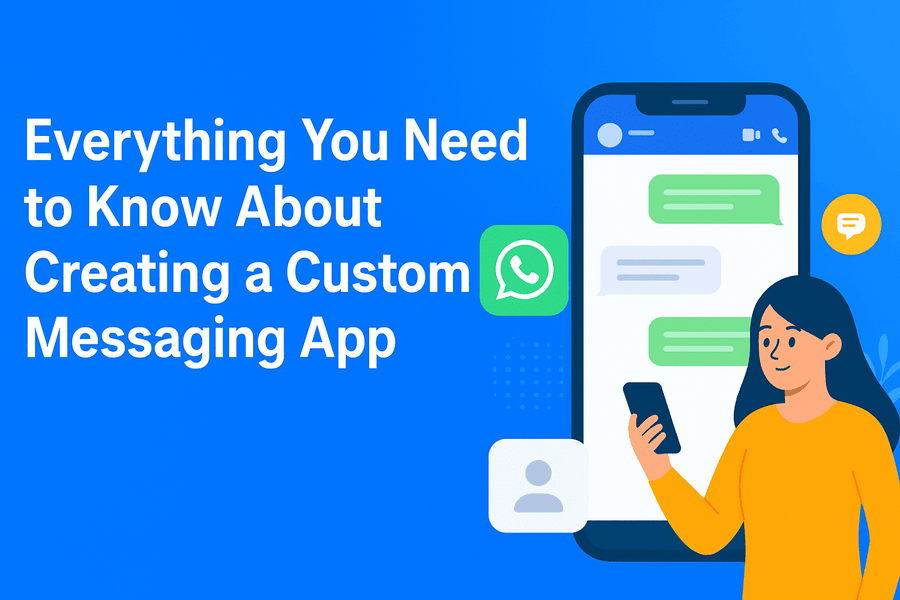Messaging applications have become a vital part of our daily lives, revolutionizing the way people communicate, collaborate, and share information. From personal chats to professional interactions, these platforms have reshaped digital communication. For entrepreneurs, the demand for secure, feature-rich, and scalable chat solutions has created a golden opportunity to build apps that rival established players in the market.
This guide will walk you through everything you need to know about creating a custom messaging platform—from the core features and technologies to challenges and growth opportunities.
Why Messaging Apps Dominate Digital Communication
The rise of smartphones and fast internet connectivity has fueled the adoption of instant messaging. Unlike email or SMS, chat platforms offer real-time interaction, multimedia sharing, and enhanced user experiences. Businesses are also leveraging them for customer support, marketing, and team collaboration.
The global appeal of messaging apps lies in three major factors:
- Convenience: Instant delivery of texts, media, and documents.
- Accessibility: Available across devices and operating systems.
- Engagement: Interactive tools such as voice calls, video calls, and group chats keep users active.
For startups, creating a WhatsApp clone app can be a strategic way to enter this booming market by delivering familiar features while also adding unique value for niche audiences.
Defining the Purpose of Your App
Before jumping into development, it’s essential to define the purpose of your platform. Do you want to build a general messaging service for a wide audience, or a niche app for specific industries such as education, healthcare, or enterprise collaboration?
Identifying your target audience will help determine which features to prioritize, whether it’s video conferencing for teams or privacy-focused communication for individuals.
Core Features Every Messaging App Needs
To compete with established players, a custom platform must deliver features that meet modern user expectations. Key functionalities include:
- One-to-One and Group Messaging: Secure and fast text communication.
- Voice and Video Calls: High-quality connections to enhance interaction.
- Media Sharing: Photos, videos, documents, and voice notes.
- Push Notifications: Real-time alerts for incoming messages and updates.
- Status or Story Updates: Temporary content to boost engagement.
- End-to-End Encryption: Ensures privacy and builds user trust.
- Search and Filters: Quick access to conversations, contacts, and files.
Building on these basics, you can also include premium features like cloud backup, integration with third-party apps, or even AI-powered smart replies.
Choosing the Right Technology Stack
The backbone of your app lies in the technology stack. The tools you select will determine its performance, scalability, and security. Common components include:
- Frontend Development: Frameworks like React Native or Flutter for cross-platform compatibility.
- Backend Development: Node.js, Java, or Python for managing servers and APIs.
- Databases: MongoDB, Firebase, or PostgreSQL to store user data and messages.
- Real-Time Messaging Protocols: WebSockets or MQTT for instant delivery.
- Cloud Infrastructure: AWS, Azure, or Google Cloud for hosting and scalability.
Selecting the right stack ensures the app is reliable and capable of handling future growth.
The Importance of UI/UX Design
A messaging app’s success depends heavily on how intuitive and attractive it is for users. A clean design, simple navigation, and fast performance are essential. Leading platforms focus on:
- Minimalist Interfaces: Avoid clutter while highlighting core features.
- Custom Themes: Allow users to personalize their chat environment.
- Accessibility: Features like dark mode, font scaling, and voice support for inclusivity.
To achieve this, businesses often choose to hire UI/UX developers who specialize in creating seamless and engaging user experiences. Investing in design ensures higher user retention and positive feedback.
Security as a Top Priority
Privacy has become one of the most important considerations for users. Without strong security measures, even the most feature-rich app can fail. Essential protections include:
- End-to-End Encryption: Ensures that only sender and receiver can read messages.
- Two-Factor Authentication: Adds an extra layer of login security.
- Regular Updates: Patch vulnerabilities to protect against cyber threats.
- GDPR and Compliance: Adhere to global data protection standards.
Highlighting security features can even be a unique selling point for your app.
Development Challenges to Overcome
While the potential is huge, building a custom messaging solution comes with its challenges:
- High Competition: Standing out among established apps requires unique features or niche targeting.
- Scalability: As the user base grows, servers must handle large volumes of data and traffic.
- User Acquisition: Convincing users to switch from popular apps demands strong marketing.
- Monetization Balance: Generating revenue without overwhelming users with ads or fees.
Some businesses choose to build a WhatsApp clone app as a starting point, customizing it for their audience to overcome these hurdles more effectively.
Monetization Strategies for Messaging Platforms
Once your platform is launched, monetization becomes a critical step. Several strategies can help turn a chat app into a profitable business:
- Freemium Model: Basic features for free, premium add-ons for paid users.
- In-App Purchases: Stickers, themes, or cloud storage upgrades.
- Subscription Plans: Premium versions with advanced features like analytics or team tools.
- Advertising: Carefully placed ads without disrupting the user experience.
- Business Accounts: Special services for enterprises to communicate with customers.
Choosing the right revenue model depends on your audience and long-term goals.
Why Building Your Own Platform Makes Sense
Launching a custom messaging application gives you control, flexibility, and opportunities that aren’t possible with off-the-shelf tools. Benefits include:
- Brand Identity: Tailor the app to reflect your company’s style and values.
- Data Ownership: Full control over how user data is collected, stored, and used.
- Feature Customization: Add or remove functionalities based on audience needs.
- Market Differentiation: Target specific industries or demographics overlooked by mainstream apps.
Whether building from scratch or adapting an existing WhatsApp clone app, the ability to innovate and evolve your product is a major advantage.
The Road Ahead for Messaging Apps
The future of messaging applications promises even more innovation:
- AI Integration: Smart assistants, predictive replies, and automated responses.
- AR and VR Features: Immersive communication for virtual meetings.
- Cross-Platform Collaboration: Seamless integration with productivity and business tools.
- Blockchain Technology: Secure and transparent financial transactions within apps.
These trends highlight how much room there still is for growth and disruption in the messaging industry.
Conclusion
Creating a custom messaging application is both a technical challenge and a business opportunity. By focusing on user needs, adopting the right technologies, and addressing security, developers can create platforms that compete with or even surpass existing market leaders.
For entrepreneurs, the decision to invest in a messaging app is not just about communication—it’s about building a scalable, innovative solution that supports long-term business goals. Whether you start with a new idea or adapt a WhatsApp clone app, the possibilities for growth in this space are immense.





